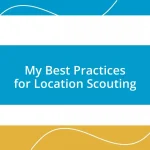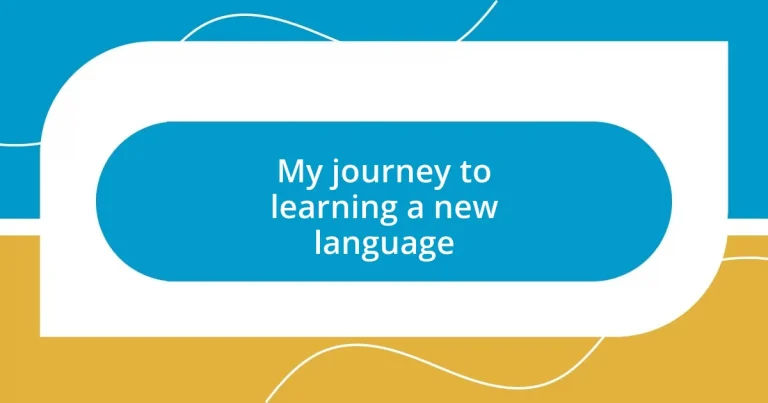Key takeaways:
- Establishing clear and flexible language learning goals enhances motivation and provides direction.
- Choosing a language that aligns with personal interests, practicality, and cultural connections fosters perseverance in learning.
- Diverse resources, including online apps, YouTube, podcasts, and community involvement, enrich the language learning experience.
- Celebrating small milestones and sharing progress with friends bolsters confidence and makes the journey more rewarding.
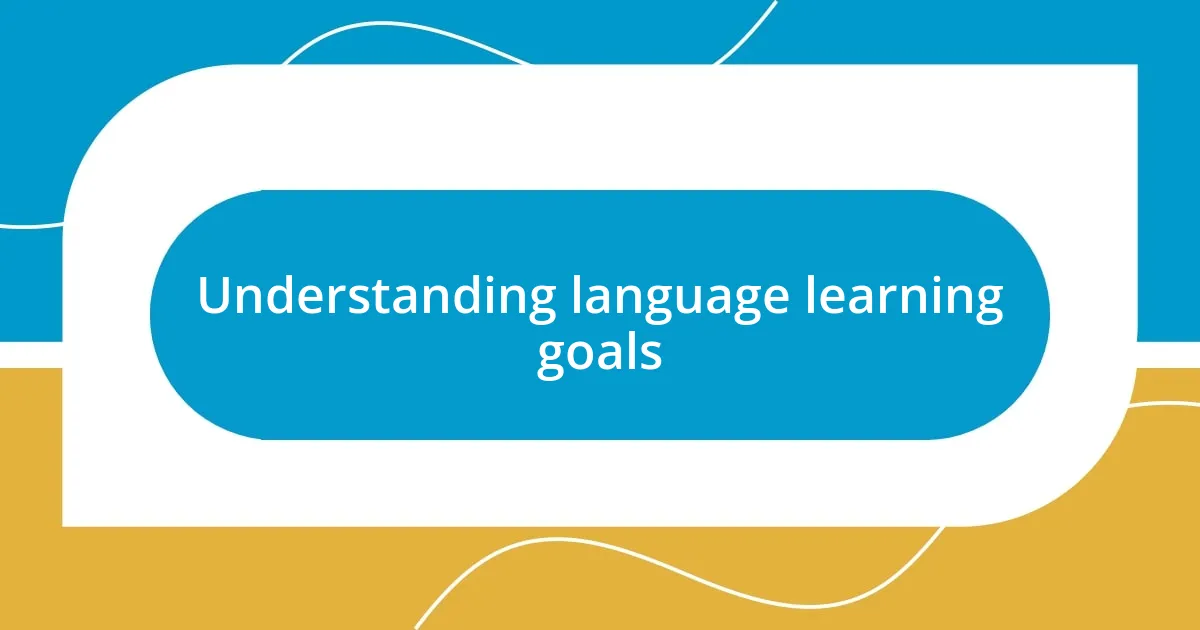
Understanding language learning goals
When I first began my language-learning journey, I set out to acquire conversational skills. I remember feeling overwhelmed by the multitude of options for learning goals—should I aim for fluency or just focus on basic communication? Defining your specific aim can significantly alter your approach; it’s essential to ask yourself what you truly want to achieve.
Establishing clear language learning goals not only gives you direction but also keeps you motivated. For instance, I once aimed to read a novel in my target language. The satisfaction I felt when I finally finished it was indescribable! Have you ever set a goal that felt just out of reach, only to realize how rewarding the struggle is once you accomplish it?
I also learned the importance of flexibility in my goals. There were times when my initial ambitions shifted—what started as a desire to impress my friend turned into a passion for exploring culture through music and films. Language learning can be a deeply personal experience, and it’s completely valid for your goals to evolve as you progress. How have your objectives changed along your journey?
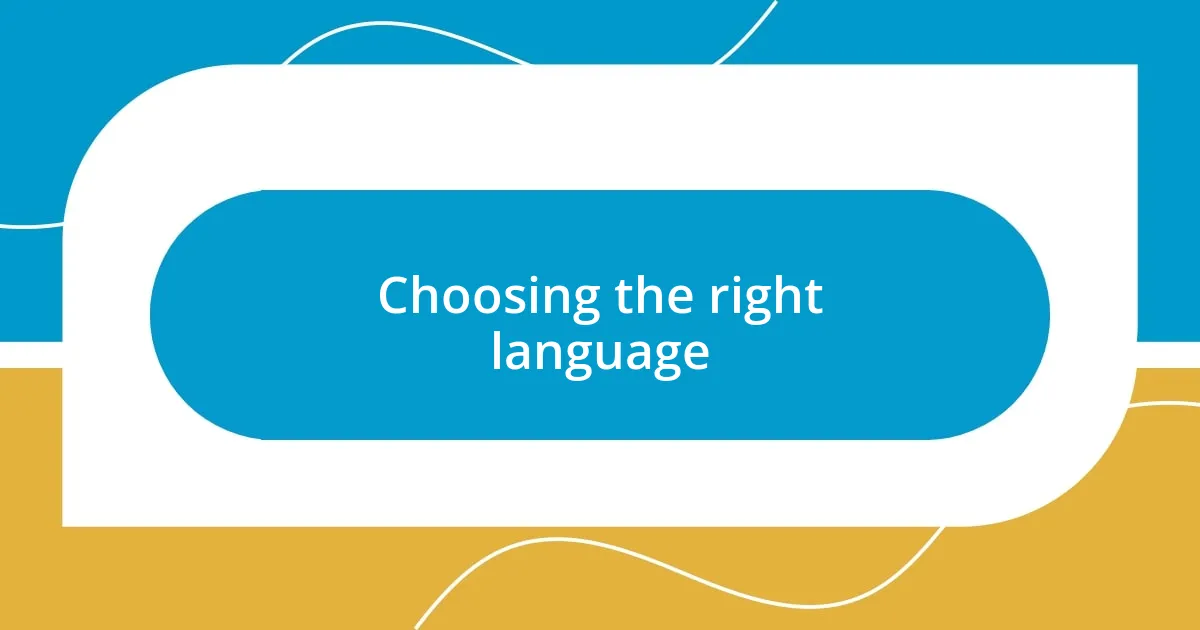
Choosing the right language
Choosing the right language can feel like navigating a vast ocean of options. I remember sitting and staring at a list of languages, each evoking different memories and aspirations. While I initially leaned towards Spanish, recalling how vibrant those sunny streets in Barcelona were, I also felt a pull toward Japanese, inspired by my love for anime and its intricate culture. It’s essential to choose a language that resonates with your interests and experiences, as that connection fuels perseverance when things get tough.
When deciding on a language, consider these factors:
- Personal Interest: Choose a language related to your hobbies, such as art, music, or travel. My passion for cooking led me to choose Italian.
- Practicality: Think about how you might use the language in your career or travels. A colleague’s ability to converse in Mandarin opened up exciting job prospects for him.
- Cultural Connection: Reflect on any particular culture that fascinates you. Learning French allowed me to dive deeper into literature and films that I adored.
- Accessibility: Evaluate the resources available for your chosen language, from classes to online programs. When I learned about accessible apps for German, it made my learning journey feel manageable.
Choosing a language that aligns with your personal story not only enriches the journey but also builds a deeper connection to the language itself.
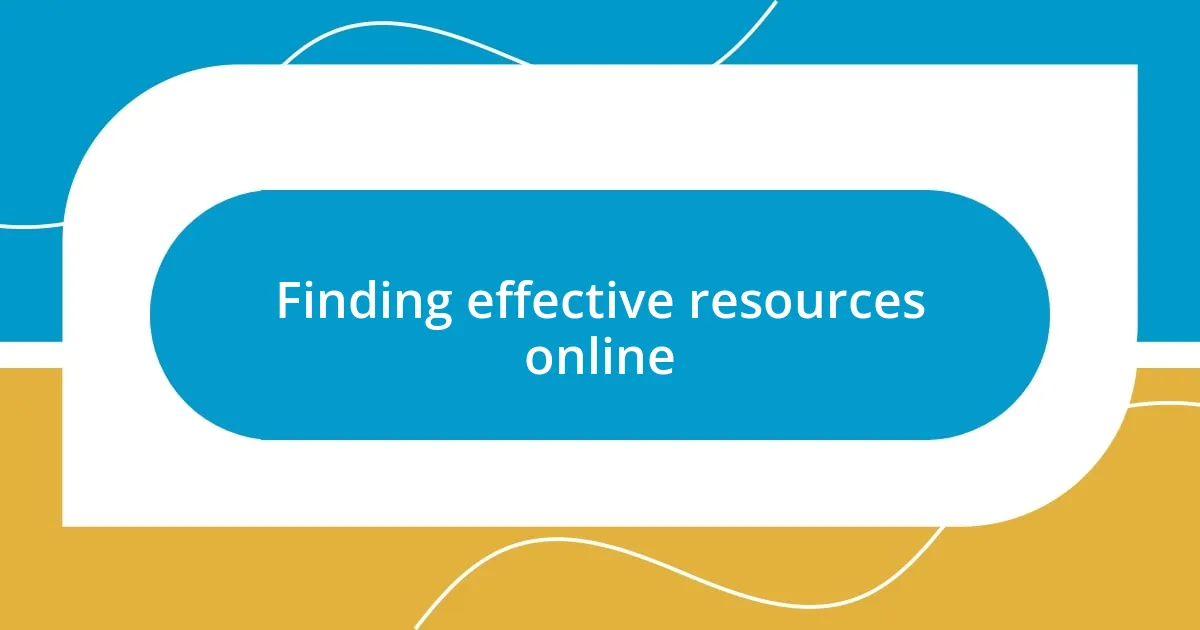
Finding effective resources online
When diving into the world of online resources for language learning, I found that the sheer volume of options can be both exciting and daunting. I remember spending hours browsing websites and forums, trying to figure out which tools aligned best with my learning style. For example, I discovered platforms such as Duolingo, which turned learning into a game, making it easier to stick with my routine. Have you ever stumbled upon a resource that made the process feel effortless and enjoyable? It can truly make a difference.
One noteworthy aspect is the importance of mixing different types of resources. I often combine video lessons from YouTube with interactive apps, helping me grasp pronunciation and contextual usage. Recently, I tried out podcasts and found them incredibly effective for improving my listening skills. It’s fascinating how each resource offers a unique perspective, helping to construct a more holistic understanding. What combination of resources have you found effective in your own journey?
Lastly, community involvement turned out to be an invaluable resource for me. Joining online language exchange groups gave me real-world practice and allowed me to connect with native speakers. Engaging in conversations taught me nuanced phrases and slang that textbooks often miss. Have you considered leveraging online communities in your learning? Those interactions not only enhance language skills but also foster friendships across cultures.
| Resource Type | Pros |
|---|---|
| Online Apps (e.g., Duolingo) | Interactive and game-like interfaces; flexible learning schedule. |
| YouTube Tutorials | Diverse content and various teaching styles; visual learning aids; free access. |
| Podcasts | Excellent for improving listening skills; accessible on-the-go; covers real-life conversations. |
| Language Exchange Platforms | Direct engagement with native speakers; cultural exchange opportunities; practical language use. |
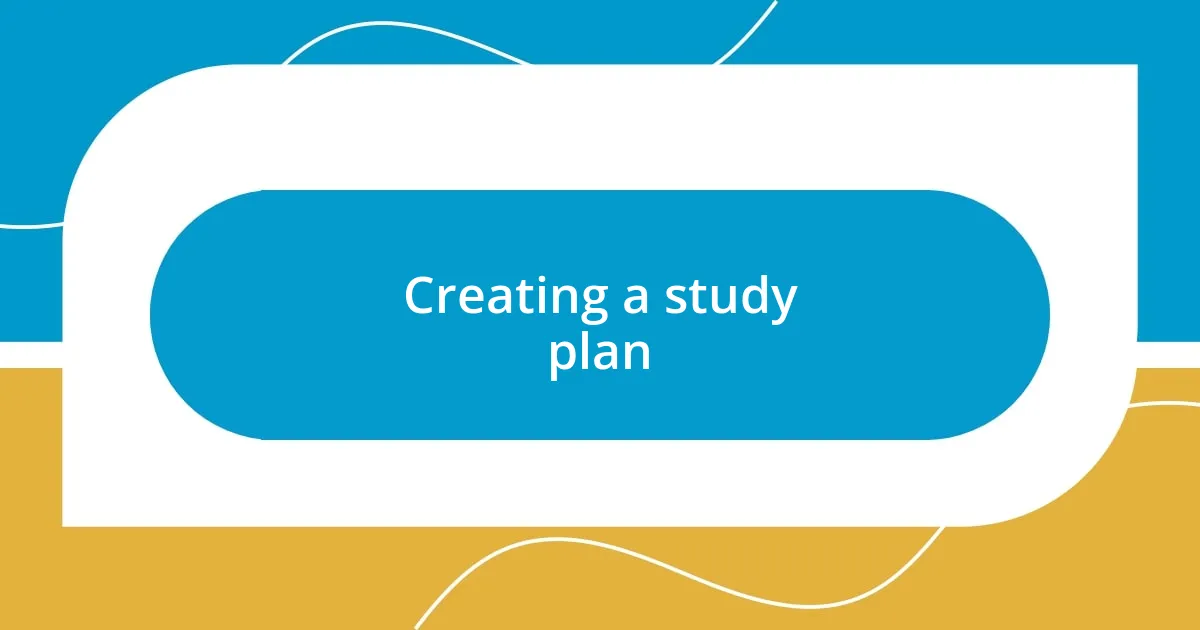
Creating a study plan
Creating a study plan can feel overwhelming, but I’ve found that breaking it down into manageable steps makes all the difference. I remember drafting my first study schedule, complete with bright colors and motivational quotes. It felt like I was setting the foundation for an exciting adventure! The key is to allocate specific times for studying and stick to them, turning learning into a routine that you can rely on.
When I first started learning French, I dedicated my mornings to grammar practice and evenings to listening exercises. This structure allowed me to engage with the language at different levels throughout the day. Have you tried mapping out your learning sessions? It can help you identify which times of day you’re most productive, making your study sessions more effective and enjoyable.
Additionally, setting realistic goals is crucial. I aimed to cover a chapter a week, but sometimes life got busy, and I had to adjust my plans. It taught me flexibility and the importance of celebrating small victories, like mastering a difficult verb tense. What milestones do you think would motivate you to keep pushing forward? Adjusting my study plan and recognizing my achievements kept me inspired and moving toward fluency.
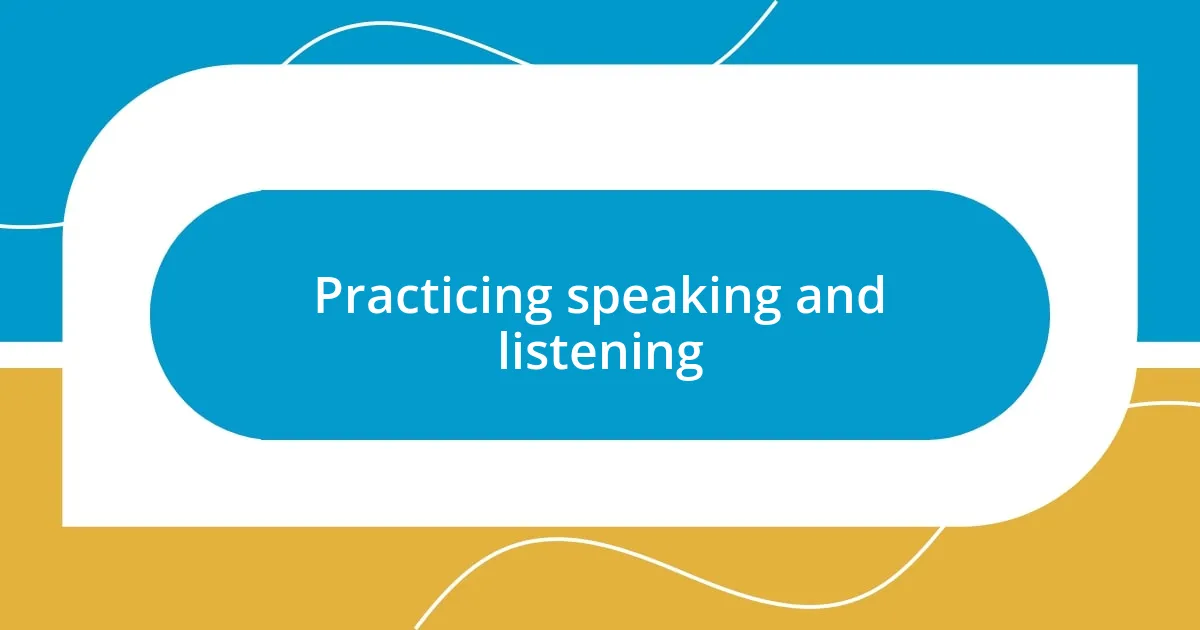
Practicing speaking and listening
Practicing speaking and listening is where I truly felt my language skills come alive. I remember the first time I joined a language exchange session via Zoom. My heart raced with excitement and a hint of fear, but as I started conversing with a native speaker, I realized that stumbling through sentences was part of the journey. Have you ever felt a mix of nerves and thrill while speaking in a new language? It’s a rush that often leads to significant progress.
I also found that incorporating music into my routine was a game-changer. Listening to my favorite songs in the target language not only improved my listening comprehension but also made me more aware of pronunciation and rhythm. When I started singing along, I felt a sense of freedom. It was like giving myself permission to embrace the language in a fun way. What songs would you curate for your own learning playlist? Finding tunes that resonate with you can make the learning process so much more enjoyable.
Moreover, I discovered the effectiveness of recording myself speaking. Initially, it felt awkward, but as I listened back, I could identify areas for improvement. This self-reflection helped me refine my pronunciation and gain confidence. Have you ever tried recording your voice? It can be eye-opening to hear your progress over time, and for me, those recordings became milestones of growth. Engaging with speaking and listening in diverse ways truly enhanced my fluency and made language learning a vibrant part of my daily life.
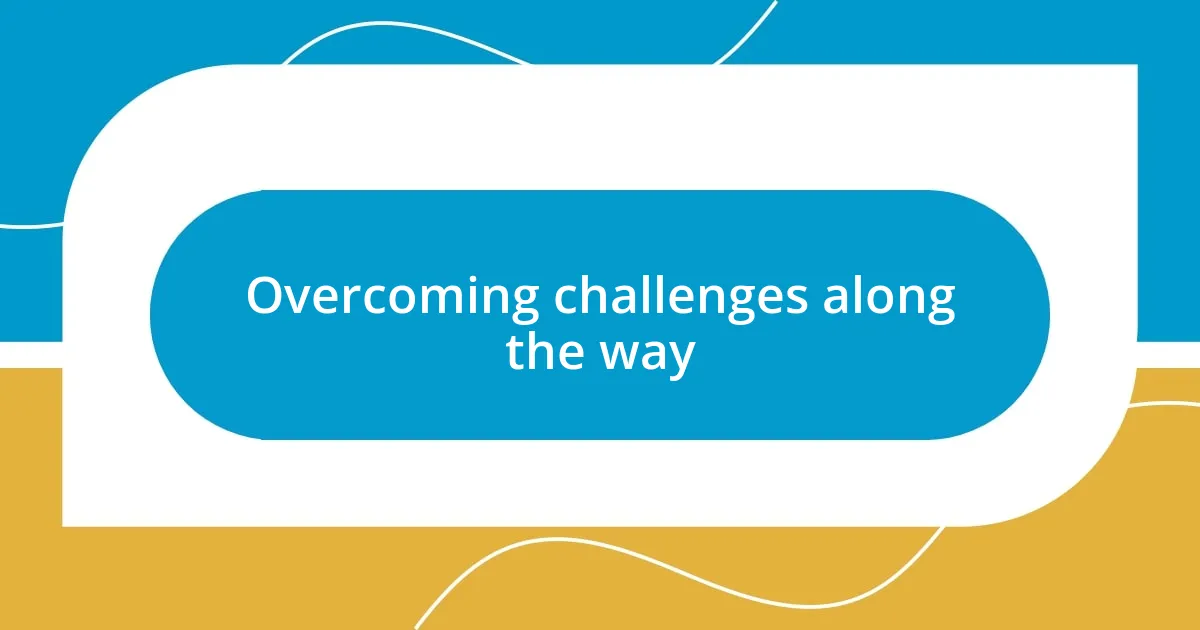
Overcoming challenges along the way
One of the biggest hurdles I faced was overcoming my fear of making mistakes. The first few times I attempted to hold a conversation in Spanish, I stumbled over my words and felt a flush of embarrassment. I quickly learned that mistakes are not the end; they’re often the best teachers. Have you ever felt that cringe-worthy moment when you said something completely wrong? I realized that each slip-up was just another step toward improvement, and with practice, my confidence grew.
Another challenge was finding enough time to practice amidst a busy schedule. I remember a particularly hectic week when I barely squeezed in half my usual study time. At first, I was frustrated, fearing that my progress would stall. However, this experience taught me to be creative. I started listening to podcasts during my commute and practicing vocabulary while cooking. Isn’t it amazing how small changes can fit learning into our daily lives? Embracing flexibility truly helped me maintain momentum.
Lastly, connecting with others is vital, but I often grappled with social anxiety. Joining a local language club felt intimidating, but that first meeting turned out to be a turning point. I discovered a warm community excited to help each other. Have you ever taken that leap into the unknown? Once I opened up to sharing my struggles and celebrating others’ successes, I felt a sense of belonging. Language learning became less about individual effort and more about a shared journey, enriching my experience profoundly.
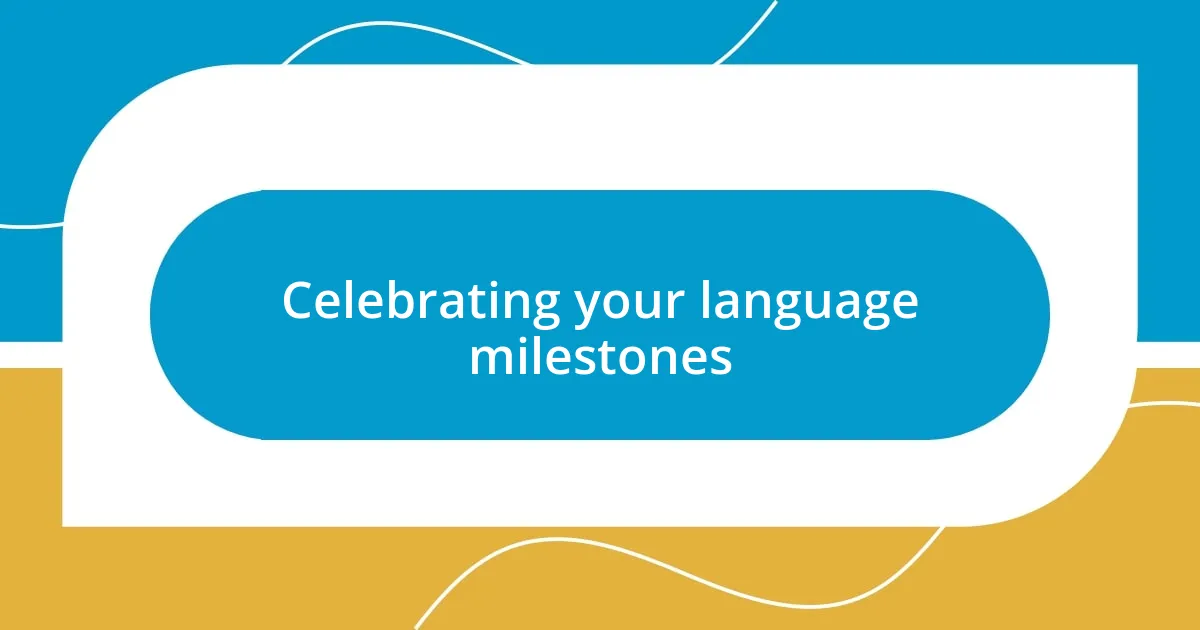
Celebrating your language milestones
Celebrating your language milestones is one of the most rewarding aspects of the learning journey. I still smile when I recall the moment I successfully ordered a meal in a quaint cafe during my travels. The waiter’s approving nod felt like a standing ovation—it was as if the universe was applauding my efforts. Have you ever encountered a moment that made all the hard work feel worthwhile? Those little victories remind us that progress isn’t always about perfection.
I found that sharing my milestones with friends and family amplified my joy. The first time I made it through an entire conversation without resorting to English, I simply had to call my best friend to share the excitement. Hearing her cheers on the other end of the line was like adding extra candles to a birthday cake—a celebration that felt just a bit bigger. Do you have someone in your life who cheers you on? A support system can enhance the highs and motivate you through the lows.
Additionally, I began documenting my progress in a language journal. Each time I achieved a goal—be it learning a tricky verb tense or understanding a movie without subtitles—I’d write about the experience and how I felt. Looking back at those entries, I see not just the language I’ve learned but also the growth I’ve experienced as a person. Isn’t it uplifting to revisit moments that spark joy and gratitude? Celebrating these milestones has transformed my language learning into an ongoing adventure worth savoring.










